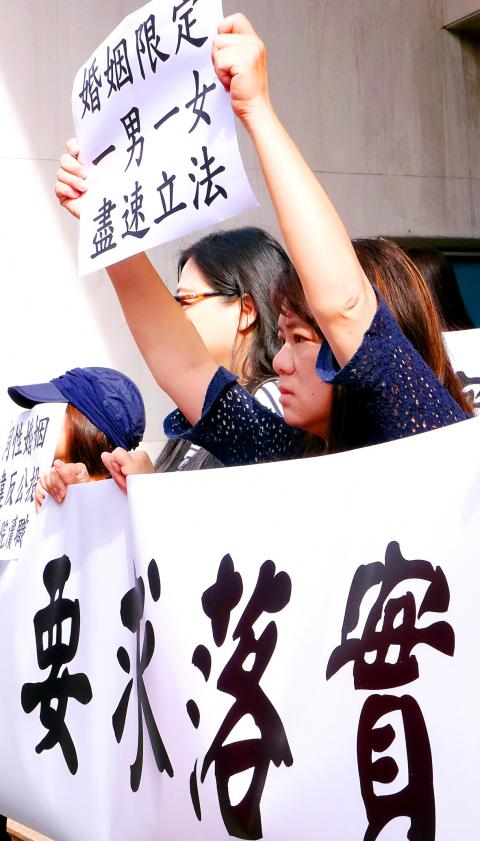A bill drafted by the Happiness of the Next Generation Alliance yesterday advanced to a second reading and would be reviewed alongside the Cabinet’s draft “enforcement act of the Judicial Yuan Constitutional Interpretation No. 748.”
The bill, titled “draft enforcement act of Referendum No. 12,” was submitted during a legislative plenary session by Chinese Nationalist Party (KMT) Legislator Lai Shyh-bao (賴士葆) on behalf of the group.
The New Power Party (NPP) caucus filed a motion to strike down the draft bill, garnering five votes for and 70 against.

Photo: Chu Pei-hsiung, Taipei Times
NPP legislators Huang Kuo-chang (黃國昌), Hsu Yung-ming (徐永明), Freddy Lim (林昶佐) and Kawlo Iyun Pacidal, as well as KMT Legislator Jason Hsu (許毓仁), voted to block the bill, while Democratic Progressive Party, People First Party and other KMT lawmakers voted to advance it.
The voting result is in line with an agreement among the legislative caucuses to review all bills concerning same-sex marriage at once.
The referendum, which asked: “Do you agree that the right to persons of the same sex to create a permanent union should be guaranteed by an institution other than marriage as defined by the Civil Code?” was passed after garnering 6.4 million “yes” votes and 4.07 million “no” votes on Nov. 24 last year.
The draft enforcement act of Referendum No. 12 refers to same-sex couples as “family members” throughout, with an explanation saying that the wording was derived from Article 1,123 of the Civil Code, which states that “a person who is not a blood relative or a spouse, but who lives in the same home, shall be considered a family member.”
The wording is in line with the Council of Grand Justices’ Constitutional Interpretation No. 748, which only states that the right of two people of the same sex to form families should be protected, but does not say how, the alliance says.
The alliance’s bill says that people who are collateral relatives to six degrees must not be same-sex family members, which is stricter than the Cabinet’s proposal, which says that collateral relatives within four degrees should not be legally united.
It also seeks to bar relatives-in-law from starting a family.
Although “eugentic considerations do not apply to same-sex family members,” the legislation has been written in a way to uphold the nation’s long-standing family ethics, the alliance said.

Nipah virus infection is to be officially listed as a category 5 notifiable infectious disease in Taiwan in March, while clinical treatment guidelines are being formulated, the Centers for Disease Control (CDC) said yesterday. With Nipah infections being reported in other countries and considering its relatively high fatality rate, the centers on Jan. 16 announced that it would be listed as a notifiable infectious disease to bolster the nation’s systematic early warning system and increase public awareness, the CDC said. Bangladesh reported four fatal cases last year in separate districts, with three linked to raw date palm sap consumption, CDC Epidemic Intelligence

The manufacture of the remaining 28 M1A2T Abrams tanks Taiwan purchased from the US has recently been completed, and they are expected to be delivered within the next one to two months, a source said yesterday. The Ministry of National Defense is arranging cargo ships to transport the tanks to Taiwan as soon as possible, said the source, who is familiar with the matter. The estimated arrival time ranges from late this month to early next month, the source said. The 28 Abrams tanks make up the third and final batch of a total of 108 tanks, valued at about NT$40.5 billion

Two Taiwanese prosecutors were questioned by Chinese security personnel at their hotel during a trip to China’s Henan Province this month, the Mainland Affairs Council (MAC) said yesterday. The officers had personal information on the prosecutors, including “when they were assigned to their posts, their work locations and job titles,” MAC Deputy Minister and spokesman Liang Wen-chieh (梁文傑) said. On top of asking about their agencies and positions, the officers also questioned the prosecutors about the Cross-Strait Joint Crime-Fighting and Judicial Mutual Assistance Agreement, a pact that serves as the framework for Taiwan-China cooperation on combating crime and providing judicial assistance, Liang

A group from the Taiwanese Designers in Australia association yesterday represented Taiwan at the Midsumma Pride March in Melbourne. The march, held in the St. Kilda suburb, is the city’s largest LGBTQIA+ parade and the flagship event of the annual Midsumma Festival. It attracted more than 45,000 spectators who supported the 400 groups and 10,000 marchers that participated this year, the association said. Taiwanese Designers said they organized a team to march for Taiwan this year, joining politicians, government agencies, professionals and community organizations in showing support for LGBTQIA+ people and diverse communities. As the first country in Asia to legalize same-sex